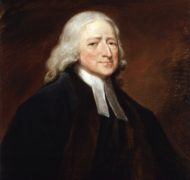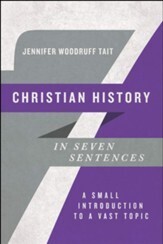Course Module in Church History - John Wesley and Economics
Seminary Curriculum / Produced by TOW Project
A while ago, my daughter received a video intended to tell the story of John Wesley’s life in a 30-minute form for 8-12 year olds. As a good historian worried about nuance, I sat down to watch it with her with some trepidation. But I’m happy to report that 8-12 year olds would come away from the video clear that John Wesley believed in free grace and helping poor people.
In a past era of my life, I taught an introductory course on the history of the Wesleys and Methodism. This course is required for United Methodist ordination and I taught it fifteen times. Each class averaged 22 students, so around 330 of my former students are now in ministry as United Methodist pastors or laypeople.
While I did not ignore the economic context of the Wesleys and Methodism while teaching the class, neither did I emphasize it. My opportunities to teach this class are now few and far between (becoming an Anglican will do that!) But meditating on the ON curricular touchpoints for church history has led me to think of some ways I would restructure the class if I ever taught it again to engage economic issues more fully, beyond simply assuming or dismissing the writings of Élie Halévy and E. P. Thompson – familiar analysts of the Wesleys and economics, beyond whom we too rarely inquire.
For the sake of space, I’ve focused on economic issues germane to Wesley’s own lifetime. A whole separate article could be written on bringing out economic themes in the American Methodist story.
- I would spend more time discussing the social and economic context of 18th-century England and I would get down into the underbrush of statistics. Most people know how Wesley lived on £28 a year and gave the rest away throughout his life. But how much would £28 actually have bought? Where did he give the money and for what purposes? How much money did the Wesleys make, how much did their followers make, and what real purchasing power did that money have? What percentage of Methodists were working class and what percentage were upper class? How much did that change during the century? What did it actually look and feel like to be a working-class follower of Wesley? There’s some material on this in The Cambridge Companion to John Wesley, which I began using as a text near the end of my time teaching United Methodist History; other helpful sources are David Hempton’s Methodism: Empire of the Spirit and possibly Samuel Rogal’s The Financial Aspects of John Wesley’s British Methodism.
- I would have students explore the prominence of economic themes in John Wesley’s own writings. We’re used to tracing the idea of grace through Wesley’s sermons. Without losing that emphasis, what if we also traced ideas of work, industry and money? I suspect they come up almost as much. I’d have students read “The Use of Money,” “On Riches,” “On Dress,” “On the Danger of Increasing Riches,” and other money-oriented sermons along with the “usual suspects” on prevenient, justifying and sanctifying grace. I’d also discuss his economic contributions to public discourse like Thoughts on the Present Scarcity of Provisions and Thoughts upon Slavery.
- I’d spend some more time with Primitive Physic and Wesley’s dispensary. While I always made sure to bring this up, we would do well to focus more closely on why Wesley found issues of health care for the poor central to his ministry, and what economic and social lessons we can learn from how he approached the practice.
- I’d connect the instituted and prudential means of grace (works of piety and works of mercy) more thoroughly. As a “high-church Methodist” for many years, I made sure my students spent time discussing Wesley’s instituted means of grace, often known as the works of piety: prayer, searching the scriptures, Christian conferencing, fasting, and the Lord’s Supper. I would not back off of my emphasis that Wesley taught these spiritual disciplines as places where God’s grace meets us especially, and can be expected to meet us. But I’d explore what it means that he also taught that works of mercy can be means of grace. What does it mean to say that the Holy Spirit can be expected to meet us as we tend to the economic and social needs of others (among other things—the prudential means are broad)? If practicing the instituted means does not lead us to practice the prudential means, have we really gotten the picture?
Wesley put grace and good works together, and did so with integrity, in a way that provides helpful models for our own day. Indeed, we could do worse than having Methodist seminarians (and maybe even others!) come away from history classes with the same idea.









